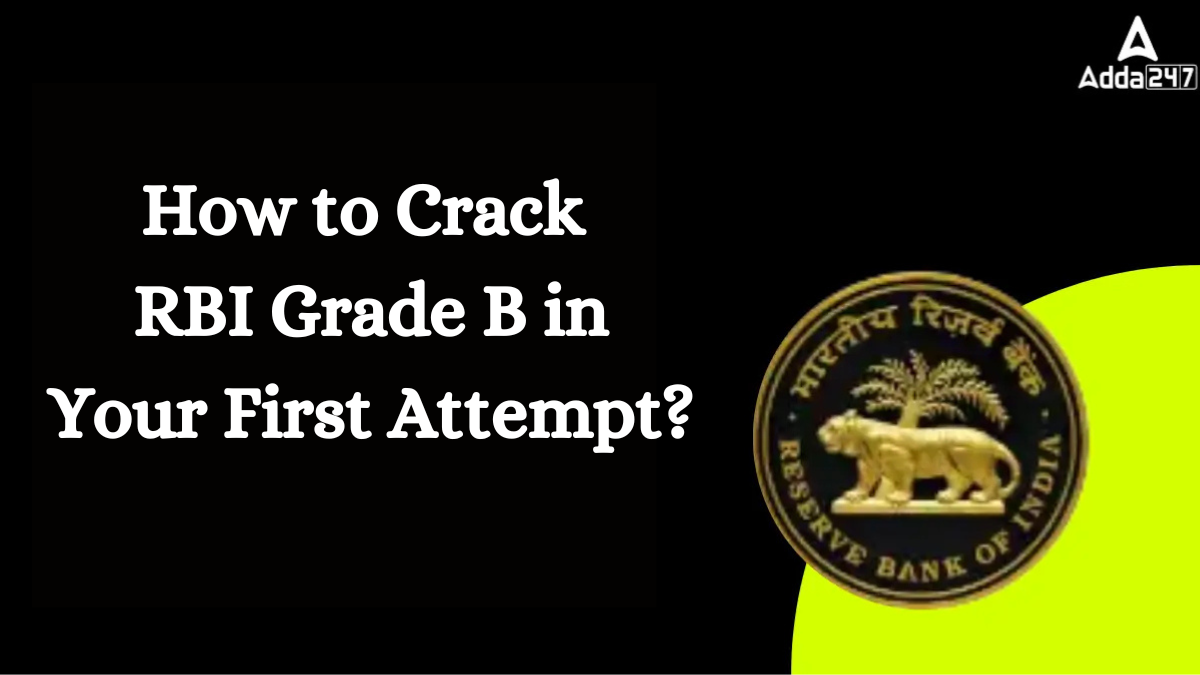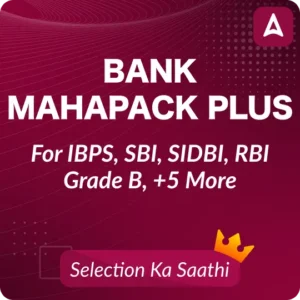Table of Contents
Cracking the RBI Grade B Exam in the first attempt may seem challenging, but with the right strategy and dedication, it is achievable. RBI Grade B Exam is one of the most prestigious in the banking sector, offering a stable career, excellent salary, and growth opportunities. Since the competition is tough, a well-structured study plan, smart time management, and consistent practice are essential. In this article, we have discussed the best preparation strategies and important tips to help candidates clear RBI Grade B in their very first attempt.
RBI Grade B Preparation Strategy For Phase 1
Phase 1 of the RBI Grade B Exam is the first hurdle that the candidates must clear to move ahead in the selection process. It consists of four sections: General Awareness, Quantitative Aptitude, Reasoning Ability, and English Language. Since this stage is qualifying in nature, the focus should be on clearing the cutoff with a good score rather than aiming for perfection in every section.
General Awareness
General Awareness carries the highest weightage and carries a total of 80 marks, making it the most scoring if prepared well. Focus on current affairs of the last 6 months, RBI reports, economic policies, and important financial news.
Quantitative Aptitude
The section on Quantitative Aptitude tests speed and accuracy. Focus on important topics like Data Interpretation, Simplification, Number Series, and Arithmetic. Regularly practicing mock tests will help in improving calculation speed and minimizing errors.
Reasoning Ability
Logical reasoning can be tricky, so it is essential to practice puzzles, seating arrangements, syllogisms, and coding-decoding regularly. Develop a strategy to attempt easy questions first and avoid getting stuck on time-consuming ones.
English Language
To perform well in the English Language, focus on reading comprehension, error detection, cloze test, and para jumbles. Developing a habit of reading newspapers and practicing mock tests will improve both grammar and vocabulary.
Importance Of Mock Tests & Time Management
Since Phase 1 also has sectional cutoffs, it is important to balance time across all four sections. Attempting full-length mock tests will help candidates identify their strong and weak areas. Focus on accuracy to avoid negative marking, and prioritize questions that can be solved quickly.
RBI Grade B Preparation Strategy For Phase 2 (Post-Wise)
The RBI Grade B Phase 2 Exam varies depending on the post applied for: General (DR), DEPR (Department of Economic & Policy Research), and DSIM (Department of Statistics & Information Management). Since each post has a different syllabus and focus areas, here we have provided the preparation strategy for each:
RBI Grade B (General – DR)
This is the most common post, and its Phase 2 consists of:
- Economic & Social Issues (ESI) – Objective & Descriptive
- Finance & Management (F&M) – Objective & Descriptive
- English (Descriptive – Essay, Précis, and Comprehension)
Economic & Social Issues (ESI)
- Focus on the Indian economy, monetary policy, inflation, financial inclusion, and government schemes.
- Read RBI reports, Economic Survey, and Union Budget to stay updated on the latest policies.
- Practice objective-type questions from previous year papers and current affairs sources.
Finance & Management (F&M)
- Cover banking systems, risk management, corporate governance, and financial markets.
- Read RBI guidelines, SEBI updates, and finance-related news.
- For management, focus on leadership theories, motivation, and HR principles from popular books.
English Descriptive
- Practice writing essays on economic and financial topics.
- Work on precis writing and comprehension skills using editorials and previous year papers.
- Improve grammar and vocabulary to enhance writing clarity.
RBI Grade B (DEPR – Department of Economic & Policy Research)
This post focuses more on economics and requires a strong understanding of theoretical concepts. Phase 2 consists of:
- Economics – Objective and Descriptive Paper
- English – Descriptive Paper
Economics (Objective Paper)
- Study microeconomics and macroeconomics concepts.
- Focus on growth models, monetary policy, and international trade theories.
Economics (Descriptive Paper)
- Prepare for essay-type questions on economic policies, inflation, fiscal policy, and financial markets.
- Structure the answers well with relevant data and diagrams.
- Read RBI, World Bank, and IMF reports to include real-world examples.
English (Descriptive Paper)
- Practice structured essay writing on economic topics.
- Work on précis writing and comprehension, focusing on clear and concise writing.
RBI Grade B (DSIM – Department of Statistics & Information Management)
RBI Grade B DSIM post requires expertise in statistics and data interpretation. Phase 2 consists of:
- Statistics – Objective and Descriptive Paper
- English – Descriptive Paper
Statistics (Objective Paper)
- Focus on probability theory, sampling methods, regression analysis, and time series.
- Practice numerical problems from books and online sources.
- Solve previous year’s Statistics questions.
Statistics (Descriptive Paper)
- Prepare for long-form answers on statistical methods, correlation, and hypothesis testing.
- Be thorough with real-life applications of statistics in banking and finance.
- Practice data interpretation and case studies to improve problem-solving skills.
English Descriptive
- Similar to other posts, focus on writing clear and structured essays.
- Practice precis writing to summarize data-driven reports effectively.
RBI Grade B Interview Preparation Strategy
The RBI Grade B interview is an important stage in the selection process and carries significant weightage in the final selection. The interview panel assesses not just the knowledge but also the personality, confidence, and ability to handle real-world banking and economic challenges. A well-structured approach to interview preparation can make a big difference in securing a top score.
Understanding the Interview Process
The RBI Grade B interview is conducted by a panel of senior RBI officials and banking experts. The questions are based on banking awareness, economic policies, financial markets, personal background, and RBI’s role in monetary policy. The duration of the interview varies, but candidates should be prepared for an in-depth discussion on topics related to the economy and banking sector.
How to Prepare for the RBI Grade B Interview?
A thorough understanding of RBI policies, recent economic developments, and financial news is essential. Aspirants should regularly read newspapers like The Hindu, Economic Times, and Business Standard to stay updated. In-depth knowledge of RBI’s functions, monetary policy, financial stability reports, and key government initiatives is crucial for answering interview questions confidently. Mock interviews play a vital role in preparation. Try to practice with banking professionals and mentors to improve their articulation, clarity of thought, and body language. Recording mock interviews and analyzing performance can help in identifying areas of improvement.
Common Questions Asked in the Interview
Interviewers may ask questions related to:
- Personal background (education, work experience, hobbies)
- Current economic and financial issues (inflation, GDP growth, RBI’s monetary policy)
- Banking-related concepts (NPA, financial inclusion, digital banking)
- Role of RBI (monetary policy tools, financial regulation, forex reserves)
- Situational and behavioral questions (problem-solving approach, decision-making skills)
Tips for Success
Confidence and composure are key during the interview. Candidates should maintain eye contact, answer questions calmly, and support responses with relevant facts and examples. Dressing in formal attire, maintaining positive body language, and being honest about what they don’t know can leave a lasting impression on the panel.
Last-Minute Preparation Tips For RBI Grade B
As the RBI Grade B exam approaches, last-minute preparation plays an important role in maximizing performance. Rather than attempting to learn new concepts, focus on revision, practice, and time management to ensure you are well-prepared for the exam day.
Revise Key Concepts and Important Topics
In the final days, go through short notes, formulas, and important concepts for all sections. For General Awareness, focus on current affairs of the last six months, RBI reports, economic surveys, and budget highlights. For Quantitative Aptitude and Reasoning, revise shortcuts, tricks, and frequently asked question types. In English, focus on grammar rules and vocabulary.
Attempt Mock Tests and Analyze Performance
Take full-length mock tests to improve speed and accuracy. Simulate real exam conditions by setting a timer and attempting the paper in one go. After every test, analyze mistakes, identify weak areas, and avoid repeating errors. Focus on sections where you can quickly score marks to maximize overall performance.
Stay Updated with Current Affairs
Since General Awareness plays a big role in scoring well, revise important financial and economic updates. Go through RBI notifications, major government schemes, international financial news, and static banking awareness topics.




 GA Capsule for SBI Clerk Mains 2025, Dow...
GA Capsule for SBI Clerk Mains 2025, Dow...
 The Hindu Review October 2022: Download ...
The Hindu Review October 2022: Download ...
 Importance of Descriptive Questions in S...
Importance of Descriptive Questions in S...


